|
Blog 5th November 2018 This is so obvious, so blindingly simple that one wonders why it’s even worth repeating. The assumption seemed to be, I must know all that’s to know about supporting them and would require nothing more. But that’s not It’s great to support a fundraising organisation that listens and learns quickly.
|
Well, it seems maybe not. As a donor, here’s what I want: Let me feel good about what I can give and what I can do. Please don’t make me feel bad about what I can’t give, can’t do, or can’t change. Sometimes fundraisers make me really quite cross, because they make such obvious mistakes. Of all that I’ve learned in four decades of fairly intensive fundraising just one simple statement stands out for me, above all others, as the fundamental ingredient of fundraising success. It’s this: This is so obvious, so blindingly simple that one wonders why it’s even worth repeating. Yet so many fundraisers still don’t get it. That’s why these days I get quite shirty when a cause I love fails to recognise this fundamental truth and makes an assumption that simply puts me off. Despite sustained media attacks on fundraising bad practices and the seemingly ceaseless efforts of a succession of fundraising leaders to elevate the donor experience above mere financial targets, the problem still seems as pervasive as ever. So, when a while back a favourite cause that I’ve supported for years wrote to ask me to up my monthly gift, I got really quite angry. Not that they asked, but how they asked. Their email told me of an outrage so terrible that – obviously, to them – I should send money so they could tackle it. It didn’t acknowledge that I was already sending them a fine sum month after month and had been doing so for a long time, nor did it explain in any detail why that would be a worthwhile thing to do. Well, I was paying them a round sum each month, wasn’t I? So, the assumption seemed to be, I must know all that’s to know about supporting them and would require nothing more. They seemed to be saying, ‘We need! Send more Ken, now!’ And to be assuming that, obviously, I would. Yet what they were seeking was no small increase. I was given three gift options: to give 60 per cent more each month, to double my existing gift, or to give 200 per cent more. What good experience, you might wonder, might merit my agreement to such a steep ask? ‘Steep’ and ‘fine’ are, of course, relative terms. I accept either might seem mean to a major donor or to a fundraiser behind in his targets. But as the donor in question, surely it’s my perception that counts? In this situation, no one else’s opinion matters a jot. Unlike some of their past emails, I did find, tucked away at the end of their fourth paragraph, a brief, single-sentence acknowledgement that they can only do what they do thanks to regular donors like me. Which is fine. Though I suspect this throw-away line was only there because I’ve complained to them before about the absence of such sentiments. Maybe that’s horribly cynical of me – but in my experience, most donors are suspicious of these constant requests for more. As the purpose of their message is to encourage donors to increased generosity, it isn’t nearly good enough. In truth I reacted this way precisely because I’ve supported these people for years with a regular monthly gift and apart from that one faint nod they’d all but seemed unaware of it – that’s what so riled me. ‘Don’t you know me?’ I wanted to shout at them. ‘I’ve been a monthly donor of yours for years. Month in, month out, without fail I support you because I believe in you. Yet you only ever write to me when you want me to sign a petition or to give you money. And you scarcely even acknowledge my regular, monthly contribution when you write. Now – again – you’re writing to tell me it isn’t enough. You want more, because, well, you want more.’ In the past, when confronted with similar messages, I’ve considered cancelling my direct debit. But, despite everything, I like this organisation and their cause matters to me. So instead, as I’ve done before with this organisation, I replied once again to point out where I believe they were going wrong. (I’m not doing this because I want their thanks and acknowledgement. I’m doing it because I want them to raise more money, to keep their donors giving more, for longer. Happily, with confidence and fulfilment.) Here’s an edited extract from my reply to their appeal.
But that’s not all that was bothering me. In the final paragraphs of their original email there was something more. This was the implicit linking of two strands of thought that once again seemed to imply that my monthly gift simply wasn’t good enough. Again, this is edited, to protect the guilty.
When first I read this, it seemed to discount my current support and to imply that without extra from me, the fight might not continue. Those few lines made me pause and doubt the wisdom of all my past donations, something that had never occurred to me before. Continued top of column 2, above.
|
Continued from the foot of column 1: I’ve written hundreds of direct mail and other appeals in my time, and a few email appeals too. I know words have precise meaning. They matter. When carefully assembled and deployed the right words are capable of taking us surely and directly to the hearts of our donors. Yet too often these days words are used with insufficient care. If their meaning is even slightly ambiguous, there can be unforeseen consequences. But I know these people. And I know fundraisers. They’re good-hearted, are they not? Clearly, dismaying their donor was not their intention. So, I complained, with the message opposite, hoping I might just get a chance to persuade them to change. Just two days later, a truly lovely email message dropped into my inbox. Not just a standard apology or message of reassurance. Much better than that. It came from a keen, impressive fundraiser who contacted me personally and offered to come and see me. She seemed really eager to listen to my observations. I was impressed, so much that I set all cynicism aside – even when she told me she’d recognised my name... It’s great to support a fundraising organisation that listens and learns quickly. But what about all those other donors who didn’t take the trouble to complain? Could some of them be cropping up now in the attrition statistics that so bedevil our sector? Might some be inclined to just take their generosity elsewhere, in the hope they’ll find a cause worthy of support, that will appreciate them? That, I fear, is an inevitability. Especially so as today’s donors, post Olive Cooke, are unlikely to cut us the slack they once did. Please, don’t just ask people to donate. Don’t make people feel bad about what they can’t do. Instead, appeal to their emotions and their principles but couched in appreciation of their ongoing support. Engage them with your story. Emphasise their achievements as well as the ongoing needs. And show them the difference they are making and can make again, through you. Then, they’ll give. Bingo! Not that difficult, is it? © Ken Burnett 2018 Related articles Please let me know if you agree or disagree with me in this (or any of my other articles). You can email me here.
Home page | Current blogs | Article archive
|
||

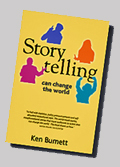
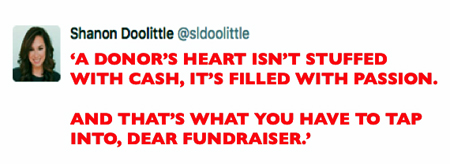
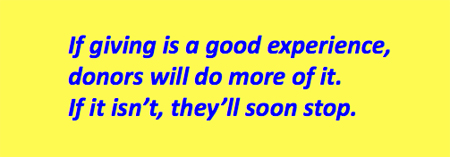
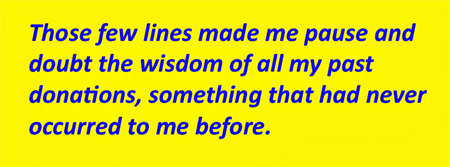

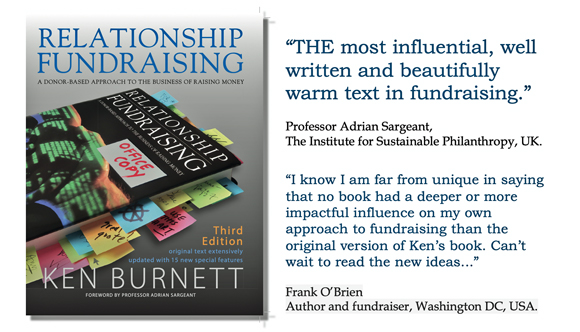
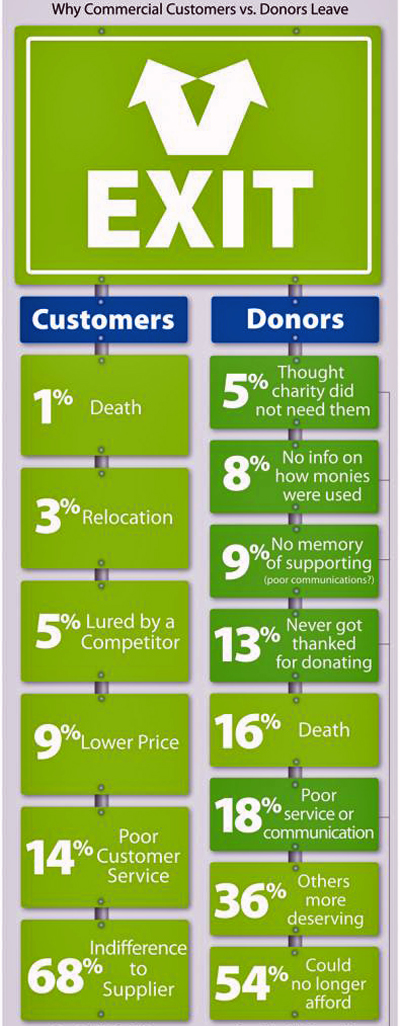 Donors leave for a variety of reasons, as the infographic above from Bloomerang and Jay Love in the USA confirms. While donors may not always reveal their real reasons, in several of these categories many will simply have concluded that they’re tired of crass asking. Though, you might also worry why donors are dying to leave so much more than customers...
Donors leave for a variety of reasons, as the infographic above from Bloomerang and Jay Love in the USA confirms. While donors may not always reveal their real reasons, in several of these categories many will simply have concluded that they’re tired of crass asking. Though, you might also worry why donors are dying to leave so much more than customers...